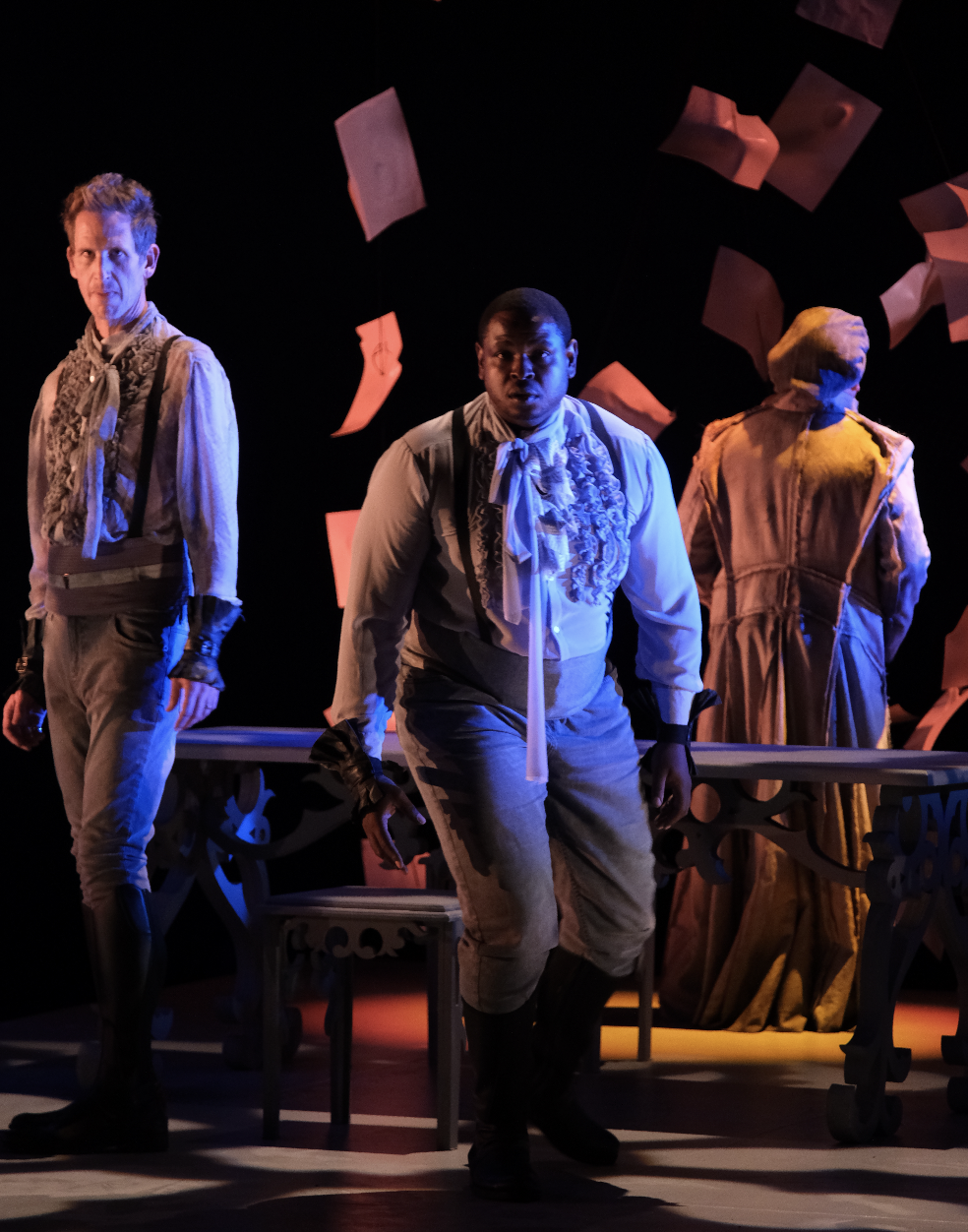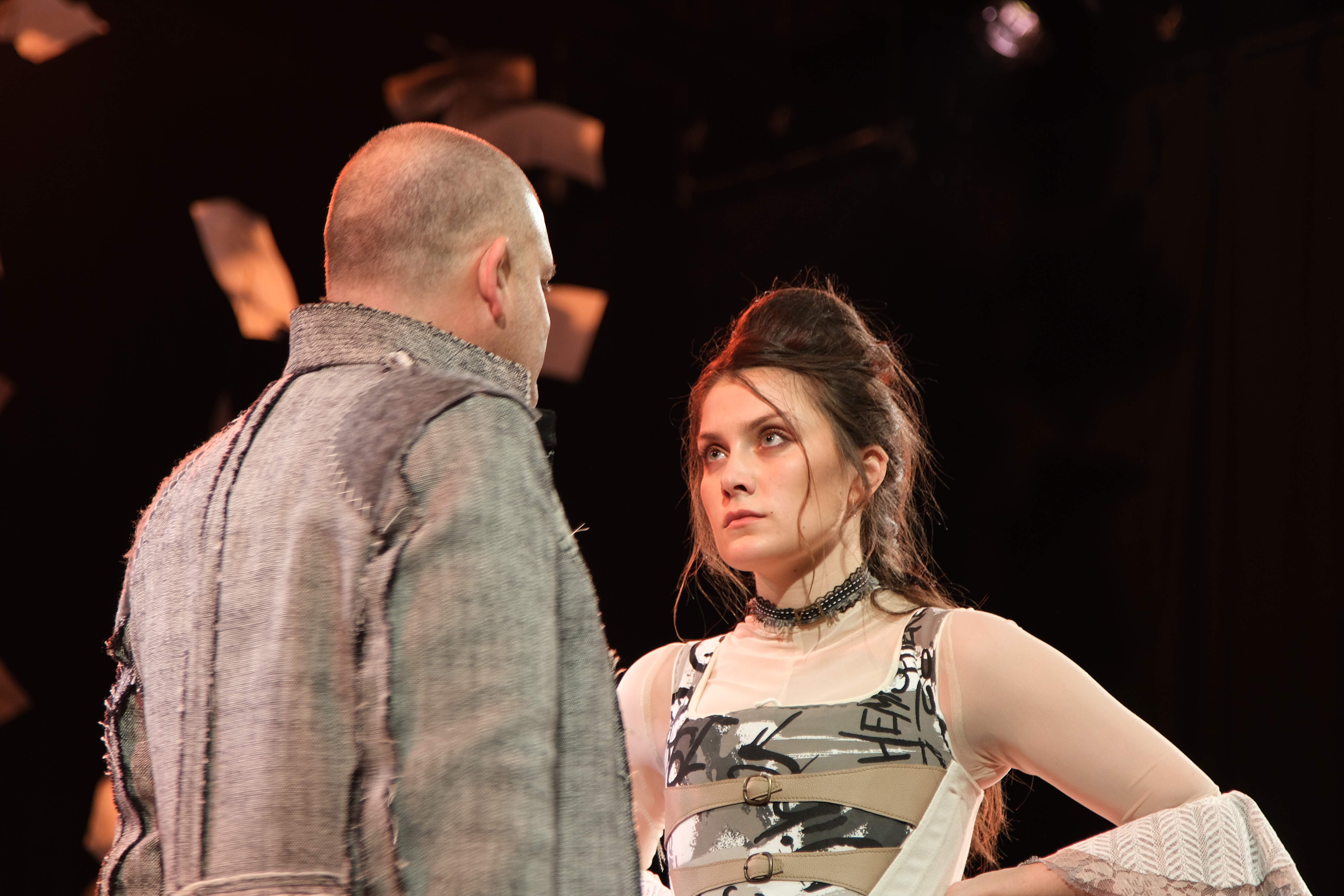THEATRE REVIEW
Amadeus — rivalry revisited as the paradoxical personality of Mozart strikes a major key

Aidan Scott as Mozart and Alan Committie as Salieri go head-to-head in this entertaining production of Peter Shaffer’s electric play about artistic genius made to suffer at the hands of a jealous, powerful and wholeheartedly mediocre establishment.
Prodigy, musical genius, man-child, egomaniac, wise-ass. Mozart, the late-18th-century Austrian composer whose life was snuffed out in poverty at the age of 35, was also an enigma.
And, if Amadeus, Peter Shaffer’s 1979 play about Mozart’s rivalry with court composer Antonio Salieri, is anything to go by, it’s quite likely he suffered from some form of ADHD and that he was probably somewhere on what we today rather flippantly refer to as “the spectrum”.
In Shaffer’s absorbing imagining of what might have transpired between the two rival composers, Mozart simply can’t quite get a handle on how to control himself in public nor when to hold his tongue. He lurches between moods, turns on a dime between bouts of affection and outbursts of fiery rage, utters sublime philosophical discourses on the nature of art and moments later emits adolescent fart sounds from his lips.
Embodied in a new South African production by the rather excellent — young, vivacious and perfectly suited-to-the-role — actor Aidan Scott, he is also on another sort of spectrum, wavering in turns between sexy, self-assured rockstar and precocious brat. He’s light and dark, troubled and liberated, short-tempered and quick-to-forgive, sharp-as-nails and yet compulsively naïve.
Scott shows us the rascally seducer of women, the lovestruck playboy capable of scandal and indecency, but just as easily reveals the soft underbelly of a troubled soul.

Aidan Scott as Mozart and Lisa Tredoux as Constanze (Stanzi) in Peter Shaffer’s ‘Amadeus’. (Photo: Keaton Ditchfield)
Mozart was scatological and profane, sure, but there’s a pensiveness, too, alongside tinges of melancholy that hint at a tortured artist who is being suffocated by the world’s inability to keep up with him.
As a character, Shaffer’s Mozart has some of theatre’s most gorgeous lines and some of its silliest. One moment a scallywag rhyme about arse-licking, the next a description of how God hears the music of his creation. Among his fatal flaws is his ego, which has been allowed to get completely out of hand, quite likely thanks to a childhood of being shown off like a party trick by his father who, somewhere in the background, still exercises a menacing psychological control over his child-prodigy son who, we’re told, was composing at an age when the rest of us are learning our ABCs.
Read more in Daily Maverick: Requiem Aeternam: Mozart’s music on life, loss and peace
Scott plays him with just the right amount of flamboyance and giddy energy, one instant pumped up and over-eager, the next moment quite torn apart. He is in scenes like a puppy dog, on his knees slobbering, kissing and suckling the Emperor’s fingers in supplication, in other moments panting and bestial between his lover’s legs.
Salieri, by comparison, I always imagined as a snake or a fox, but in Geoffrey Hyland’s slightly camp and rather playful rendering, Alan Committie brings a kind of pussy-cat energy to the character. That means there’s a lot of skulking, plenty of plotting, and whole scenes where instead of a snarl or a sneer we see a pair of large wet eyes concealing the venomous deceit going on inside.
His duplicity, of course, is no secret to us. And yet in Committie’s interpretation, he’s not altogether evil.

A scene from ‘Amadeus’. (Photo: Keaton Ditchfield)
Pernicious, pious, snivelling, underhanded, yes, but we’ve seen Committie cranking it up in far more evil roles. There was Richard III, when he was simply tyrannical. But here the trick seems to be to appeal to our sympathies. He wants us to feel Salieri’s pain, understand his anger with God for choosing to bestow such overflowing genius on a profane little sex-on-legs pipsqueak pup like Mozart, while he himself is doomed to mediocrity.
Committie seems to be using the audience as a mirror for Salieri, or perhaps making of Salieri a mirror held up to the audience. We’re tasked with recognising in him that part of ourselves that’s made conspicuous when a true genius walks into the room: human inferiority.
It is of course a play filled with ideas, a vehicle through which to express out loud some of the most stunning ideas about the purpose of music, the very idea of what it means to create art. It is also perplexing to hear Salieri express that he alone is truly aware of Mozart’s brilliance; it kind of hammers home the nasty suspicion that, somewhere below mediocrity there’s a vast pool of something far worse.
All of these ideas are wrapped up in an entertaining bouquet, one that works hard to stay light, even effervescent, and to convey its comic touch even as an unavoidably tragic tale unfolds. The jokes, whimsical characterisations and occasionally dazzling obscenities are there to help the medicine go down, but the serious speeches, the discussions about music and the descriptions of how a great artist might envision a masterpiece, are masterfully rendered and quite beautiful to hear spoken out loud.

Alan Committie as Salieri and Lisa Tredoux as Constanze (Stanzi) in Peter Shaffer’s ‘Amadeus’ at Theatre on the Bay. (Photo: Keaton Ditchfield)
At the Theatre on the Bay, where Amadeus is now playing, the wings have been opened up to let some of the backstage darkness infiltrate the brightly lit world of the Viennese court where much of the action takes place.
A frieze of fluttering paper serves as backdrop to the action, an explosion of folios that might be sheet music or pages out of history, or perhaps a reminder that what we’re watching is an amalgam of ideas based only upon what was written down, that these historic accounts are potentially as unreliable as the play’s narrator.
The costumes are period-inspired, yet draw from elsewhere, too, elements of punk, touches of camp, they could be wardrobe for a music video, circa 1985. The outfits come with frayed edges, the pants are made from some sort of denim evoking a flamboyant pastiche that also seems to remind us that what’s on stage is an interpretation rather than a simulation of history. We’re watching an artwork about a battle between two artists — it is metafiction, not a documentary.
On the one hand, Shaffer has written the story for Salieri, made him the mouthpiece, given him — the bad guy — control of the narrative.

Léa Blerk in Peter Shaffer’s ‘Amadeus’. (Photo: Keaton Ditchfield)
On the other hand, Mozart is simply such a whizkid, so bright, so intellectually agile and so naughty and insatiable. As we witness all of his lifelines being stripped away, see his descent into obscurity thanks to his inability to play by the rules or fit in, something altogether terrifying becomes apparent, a frightening truth Hyland and his team have unlocked: the idea being that perhaps we have Salieri to thank for Mozart’s immortality.
After all, had he not died, too young, at the hands of his enemy, he might have become precisely what that enemy — Salieri — became: old, bitter, resentful. Perhaps, he too, might have slid into mediocrity, scoffing sweet treats in the wings, scolding God for his inferiority.
Instead, thanks to Salieri’s treachery, Wolfgang Amadeus Mozart became a rockstar, immortalised, eternally young. And known to us even by something as insignificant as his middle name. DM
Amadeus is playing at Theatre on the Bay in Cape Town until 18 May. Tickets available from WebTickets.



















Comments - Please login in order to comment.